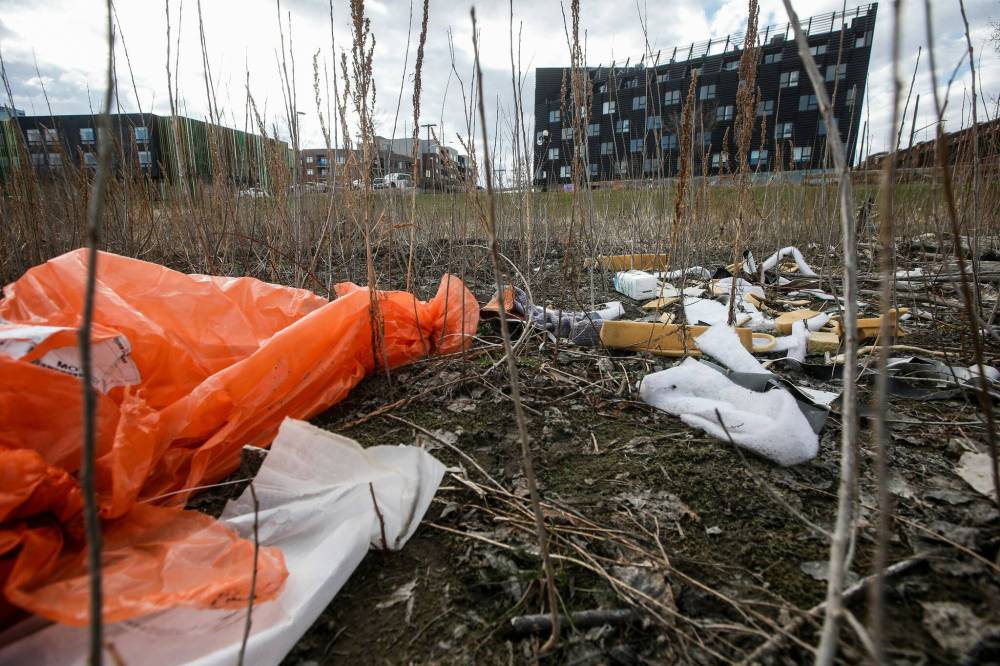A pilot project proposing a regular cleanup of homeless encampments will not address the environmental impacts of the camps or tackle the larger issue of homelessness in Winnipeg, area residents and advocates say.
John Giavedoni, an east Exchange District resident for the last 17 years, took a walk down Waterfront Drive over the weekend and was dismayed to see garbage strewn throughout Fort Douglas Park.
“The conditions these people are living in are less than Third World,” he said Monday afternoon. “There’s signage that it’s a preservation area, and the city has ignored all of that and allowed these people to live in a condition that’s just horrible.”

JOHN WOODS / FREE PRESS
Some residents are disappointed to see garbage strewn about in designated naturalization areas in the city, such as Fort Douglas Park.
On Monday, the greenspace at Fort Douglas Park was littered with garbage while abandoned tents, some standing and some deflated, were clustered in pockets throughout the area.
Garbage bags overflowed near empty trash receptacles and 311-issued black bins could be seen near the walkway that leads along the shoreline of the Red River.
Some areas where there was evidence of prior camps were devoid of grass and vegetation.
Laurie Nealin, another area resident, said the city needs to start enforcing its own bylaws instead of letting the problem persist by authorizing camp cleanups.
“We have been asking the city, ‘Why aren’t you abiding by your own bylaws? Why are you letting this happen in this protected forest? In a city park?’ The (park) is basically at the tipping point of no return,” she said.
According to the city’s parks bylaw, people using the park cannot litter or dump materials on the grounds, or damage trees, soil or turf within the park. Camping is also prohibited.
Stephen Juba Park and Fort Douglas Park, which snake along Waterfront Drive and have been the site of encampments in recent years, are also designated naturalization areas.
Under the city’s Ecologically Significant Natural Lands Strategy, crews are directed to eliminate or reduce grass mowing in naturalized areas to provide a buffer zone that encourages native plant species to grow and spread in an effort to boost biodiversity.
City council’s executive policy committee voted last week to commit up to $170,000 to enter agreements with community organizations to clean up encampments and connect homeless people with social services. A final vote on the pilot project is set for Thursday.
Giavedoni, who acts as executive director for community group Residents of the Exchange, said the money would be better served going towards housing so parks can be restored instead of maintained as encampments.
A report written by city chief administrative officer Michael Jack and submitted to council last week indicated the city paid $83,888 for 162 encampment cleanups last year. To clean up each camp once a week, Jack estimates the city would have to spend approximately $4.06 million a year.
“If the city spends any money on this project to clean up, it’s money wasted,” Giavedoni said.
“Provide social services and clean up the park so that it can, in a couple of years, be returned back to a beautiful park and then the city can learn from that experience, claim a victory and move on to the next area, all while you’re dealing with the overall homeless issue.”
Josh Brandon of the Social Planning Council of Winnipeg called the issue a misdirection of anger.
Brandon, also a board member of the Manitoba Eco-Network, said industry and rail lines in the area, as well as fires in vacant and derelict buildings, are just as bad for the environment. Those who take issue with the environmental impacts of encampments should hold the same standard to building owners and businesses that fail to be stewards of the environment, he said.
“We shouldn’t be laying the blame for a whole host of environmental degradation problems in the inner city on people experiencing homelessness,” he said.
Brandon applauded the proposed pilot project. Having access to garbage pickup will improve quality of life and reduce tensions between encampment dwellers and nearby residents, he said, but warned without significant investment in social housing, the project would go nowhere.
Mayor Scott Gillingham has previously said the city is working with service agencies and the province to address homelessness more broadly but recognizes camps can be unsightly and dangerous for nearby residents.
Nealin wants to see the city not only clean up existing camps, but to prohibit more camps from forming in the east Exchange District.
“That has to be part of the plan, or the situation is never going to change,” she said.
nicole.buffie@freepress.mb.ca

Nicole Buffie
Multimedia producer
Nicole Buffie is a multimedia producer who reports for the Free Press city desk.